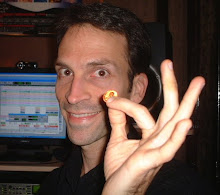So you've gone out and hustled up a bunch of gigs, and now you're looking for someplace to stash all of that cash. Where should you put it? You don't necessarily have to do all of your banking at the closest neighborhood commercial bank. In the United States, other options to consider include online banks, credit unions, savings banks, even PayPal!
Most of us musicians operate on an independent freelance basis, often receiving cash and checks from multiple sources. Every week, I get a stack of tiny little paychecks to deposit, so I need to have a convenient branch for day-to-day banking services. For this purpose, a checking account at the local bank is the way to go.
But frankly, keeping much more than your basic living expenses in a commercial bank account doesn't make sense these days. Have you looked at your bank's list of fees lately? I was recently charged $10 by my bank for receiving a wire deposit into my account. That's right -- they actually charged me a fee to accept a deposit! Many bank fees in recent years have been escalating at a double-digit rate, and when you consider the fact that they usually aren't even paying interest on your balance, there's no reason to reward them by depositing much more than the minimum balance.
For your larger, longer-term cash savings, consider opening an account at a credit union. Credit unions operate much like conventional banks, but are established and owned by groups of people with a common affiliation, such as a labor union or large employer. Many credit unions seek to expand their membership, so often they will accept you as a member even if you are not directly involved in the affiliated group. You will have to buy a token "share" of ownership in order to open an account, but because of the cooperative nature of credit unions, interest rates and fees are usually much more favorable than at conventional banks. Credit unions are also eligible for Federal deposit insurance, just like commercial banks.
Savings banks (and S&L's) are similar to commercial banks, and have traditionally offered somewhat more competitive rates. They have also traditionally gotten into more financial trouble, starting with the S&L crisis of the late 1980's and continuing with their large exposure to bad mortgages in the current banking crisis. Still, most deposits are insured, so you and I don't have to worry too much about it as customers.
Online banks, such as HSBC Direct and ING Direct, are giving brick-and-mortar banks a real run for their money. They reduce costs by not maintaining branches, and pass that on to you by offering very competitive rates. The downside, of course, is that you have to mail in all of your checks (unless you have direct deposit), and you give up the convenience of service at a local branch.
One other place you can keep some money is PayPal. Though it's not a bank (and not Federally insured), PayPal is now offering many of the same services as banks, including debit and credit cards, interest bearing accounts, and international money transfers. Personally, I'm looking forward to the day when all payments will be handled electronically. No more cash, no more checks, no more waiting in line at the bank on Monday afternoons, and no more absurd fees (hopefully)!
Subscribe to:
Post Comments (Atom)






No comments:
Post a Comment